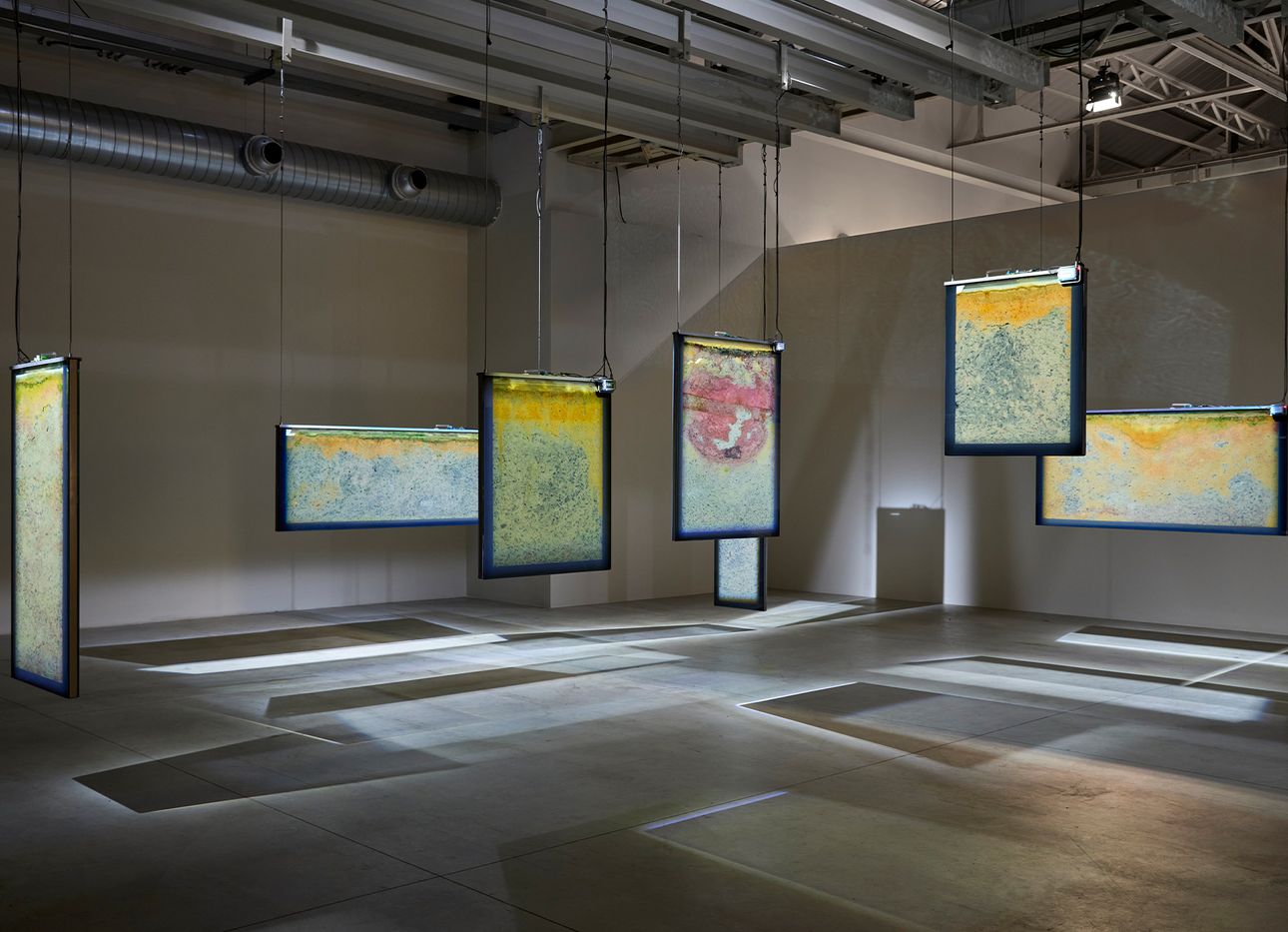
A Potent Anicka Yi Exhibition in Italy Features Bacteria, Artificial Intelligence, and Dried Shrimp
Anicka Yi’s intoxicatingly sensory installations don’t just surround the viewer—many of them literally permeate the body, their scents seeping into pores and penetrating nostrils. Take “Immigrant Caucus,” a 2017 work by the Seoul-born, New York–based artist (who was the guest on Ep. 14 of our At a Distance podcast), in which three industrial steel tanks saturate the air with an aroma concocted by fusing secretions from carpenter ants with sweat samples from Manhattan’s Chinatown and Koreatown. Paired with a metal mesh gate, it’s an incisive meditation on Asian American identity, exploitative labor, and intolerance.
This sociopolitical fragrance finds a particularly potent home in its most recent installation at the entrance of “Metaspore”—a word conceived by Yi that points to her abiding interest in the relationship between technology (meta) and living organisms (spore)—Yi’s most comprehensive exhibition to date, on view through July 24 at Milan’s Pirelli HangarBicocca, a cavernous former factory that once churned out trains, farm equipment, and, during World War I, military aircrafts. It’s a fitting gateway for a show that explores the past 12 years of Yi’s practice—one that rigorously examines what she calls the “biopolitics of the senses.”
Created using a range of materials including shape-shifting bacteria, animatronic insects, and electrochemical sensors, the more than 20 works assembled animate in various ways: Some emit heady smells or ooze unidentifiable goo. Others cultivate ecosystems that metabolize the world around us, with all its emotional, political, and technological complexities. Among them is “Skype Sweater,” an early piece from 2010, which consumes one corner of the space with a billowing military parachute that looks more like a giant lung or a makeshift encampment than a tool of war. Three translucent sculptures encircle the heaving form, enhancing its connection to the corporeal: a clear Longchamp bag that encases cow’s entrails suspended in gel, a Mylar envelope cloaked in crispy tempura batter, and a mass of transparent glycerin that mummifies razor blades surrounded by red stains. All drive home themes of disembodiment and displacement in our globalized, tech-saturated society.
Elsewhere, Yi’s interest in the microbial explores the timely connection between viral spread and human migration and interaction. In the center of the room is Yi’s 2015 series of five transparent PVC sheds, all emblazoned with bright, abstracted biological hazard symbols and containing unexpected combinations of objects. Those inside one shed, “Your Hand Feels Like a Pillow That’s Been Microwaved” (2015), include steel pipes, beeswax, dried shrimp, and hair gel. Each is visible, but inaccessible. Yi conceived the idea for the installation in response to an Ebola outbreak in West Africa, as she describes in the exhibition materials, as a reflection on the “societal violence I observed through my own version of ‘quarantine tents,’ containers that restrict air exchange, but also the movement and interaction of living beings.”
While seemingly impermeable, these structures diffuse a pungent scent that penetrates their vinyl walls and fills the surrounding space. Formulated with an M.I.T.–trained synthetic biologist (Yi often collaborates with scientists and technologists) for a 2015 presentation at the New York experimental art space The Kitchen, the fragrance mingles the bacterial samples of 100 women, all socially connected to Yi. The metaphor is clear: Joined together, this collective network of women is breaking free from walled confines. It also reminds viewers of bacteria’s more positive qualities—while they may help cultivate viruses, they also connote human connectivity.
Recent works in the show more actively address the time to come—in particular, the rapidly mutating relationship between organisms and technology. The most powerful of these is “Biologizing the Machine (spillover zoonotica)” (2022), a site-specific installation adapted from Yi’s 2019 Venice Biennale installation. Here, seven rectangular glass vitrines, resembling ant farms and lush abstractions, hang from the ceiling. Each structure contains a rich micro-ecosystem of soil bacteria and algae connected to a network of artificial intelligence that tracks the microbial activity within it, and adjusts the climate to temperatures that encourage growth. In this case, the installation’s title emphasizes Yi’s interest in interspecies, multi-organism interaction, and hybridization—a near future where the lines between plant, animal, human, and machine blur, permeating and learning from one other.